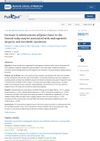
Thicker scalp fat may link hair loss with metabolic syndrome.
136 citations,
September 2019 in “Journal of Clinical Investigation” Dermal adipose tissue in mice can change and revert to help with skin health.
 18 citations,
September 2020 in “International Journal of Nanomedicine”
18 citations,
September 2020 in “International Journal of Nanomedicine” Both human and animal-derived small extracellular vesicles speed up skin healing equally well.
 9 citations,
January 2018 in “Stem Cells International”
9 citations,
January 2018 in “Stem Cells International” Deer antler stem cell fluid helps regenerate tissue better than fat-derived stem cell fluid.
 September 2023 in “Frontiers in Medicine”
September 2023 in “Frontiers in Medicine” The scalp fat tissue of men with hair loss shows changes in gene activity that may contribute to their condition.
 60 citations,
June 2019 in “Ageing Research Reviews”
60 citations,
June 2019 in “Ageing Research Reviews” Fat from the body can help improve hair growth and scars when used in skin treatments.
 42 citations,
May 2016 in “Annual Review of Cell and Developmental Biology”
42 citations,
May 2016 in “Annual Review of Cell and Developmental Biology” Fat cells are important for tissue repair and stem cell support in various body parts.
 October 2023 in “Benha Journal of Applied Sciences”
October 2023 in “Benha Journal of Applied Sciences” PPAR-γ may be a key target for treating alopecia areata and other skin conditions.
 November 2019 in “Клітинна та органна трансплантологія”
November 2019 in “Клітинна та органна трансплантологія” Adipose-derived stem cells are useful in aesthetic medicine and dermatology for improving skin and tissue appearance.
 33 citations,
September 2019 in “Dermatologic Surgery”
33 citations,
September 2019 in “Dermatologic Surgery” Using a special stem cell formula on the scalp once a month for six months helped people with hair loss grow more hair.
 218 citations,
October 2013 in “Proceedings of the National Academy of Sciences of the United States of America”
218 citations,
October 2013 in “Proceedings of the National Academy of Sciences of the United States of America” Mice lacking the PPARγ gene in their fat cells had almost no fat tissue, severe metabolic problems, and abnormal development of other fat-related tissues.
 20 citations,
June 2020 in “Stem Cell Research & Therapy”
20 citations,
June 2020 in “Stem Cell Research & Therapy” Using stem cells from fat tissue can significantly improve wound healing in dogs.
 8 citations,
January 2012 in “JIMD reports”
8 citations,
January 2012 in “JIMD reports” A new mutation in the AGPAT2 gene causes severe fat tissue loss and related health issues by reducing the protein's levels.
 February 2024 in “World journal of stem cells”
February 2024 in “World journal of stem cells” Adipose-derived stem cells can help repair and improve eye tissues and appearance.
 14 citations,
November 2020 in “International Journal of Molecular Sciences”
14 citations,
November 2020 in “International Journal of Molecular Sciences” Advanced therapies like gene, cell, and tissue engineering show promise for hair regrowth in alopecia, but their safety and effectiveness need more verification.
 11 citations,
August 2018 in “Facial Plastic Surgery Clinics of North America”
11 citations,
August 2018 in “Facial Plastic Surgery Clinics of North America” Adipose-derived stem cells show potential for skin rejuvenation and wound healing but require more research to overcome challenges and ensure safety.
MFN2 mutations cause mitochondrial problems, leading to more upper body fat and lower leptin levels.
MFN2 mutations cause mitochondrial problems, unusual fat distribution, and low leptin despite high body fat.
 May 2023 in “Cytotherapy”
May 2023 in “Cytotherapy” Hair follicle and adipose cell vesicles both protect neurons and reduce inflammation similarly.
 3 citations,
March 2017 in “Regulatory toxicology and pharmacology”
3 citations,
March 2017 in “Regulatory toxicology and pharmacology” Aleglitazar and its major metabolite are safe enough to proceed to Phase 3 clinical trials.
 45 citations,
August 2018 in “Stem Cells International”
45 citations,
August 2018 in “Stem Cells International” Stem cells, especially from fat tissue and Wharton's jelly, can potentially regenerate hair follicles and treat hair loss, but more research is needed to perfect the treatment.
 39 citations,
March 2009 in “Clinics in plastic surgery”
39 citations,
March 2009 in “Clinics in plastic surgery” Injection lipolysis effectively reduces small fat deposits and should be done with care and proper patient selection.
 36 citations,
August 2011 in “Journal of Controlled Release”
36 citations,
August 2011 in “Journal of Controlled Release” Genetically-altered adult stem cells can help in wound healing and are becoming crucial in regenerative medicine and drug design.
 35 citations,
March 2014 in “British Journal of Dermatology”
35 citations,
March 2014 in “British Journal of Dermatology” Hair loss in male pattern baldness involves muscle degeneration and increased scalp fat.
 28 citations,
November 2014 in “Current Diabetes Reports”
28 citations,
November 2014 in “Current Diabetes Reports” Girls with PCOS during adolescence have a higher risk of developing type 2 diabetes, and early treatment can help manage this risk.
 15 citations,
October 2011 in “Gynecological Endocrinology”
15 citations,
October 2011 in “Gynecological Endocrinology” Obesity changes androgen levels in women with PCOS, leading to higher testosterone relative to androstenedione.
 7 citations,
March 2017 in “Medical Hypotheses”
7 citations,
March 2017 in “Medical Hypotheses” Aquaporins could be new drug targets for treating polycystic ovary syndrome.
 January 2024 in “International Journal of Dermatology Venereology and Leprosy Sciences”
January 2024 in “International Journal of Dermatology Venereology and Leprosy Sciences” Patients with acne vulgaris have lower serum irisin levels.
 September 2023 in “Stem cell reviews and reports”
September 2023 in “Stem cell reviews and reports” Scientists found a new, less invasive way to get stem cells from horse hair for veterinary medicine.
 65 citations,
January 2018 in “Nature Reviews Endocrinology”
65 citations,
January 2018 in “Nature Reviews Endocrinology” Skin fat has important roles in hair growth, skin repair, immune defense, and aging, and could be targeted for skin and hair treatments.



























